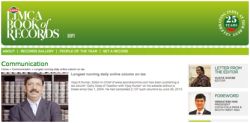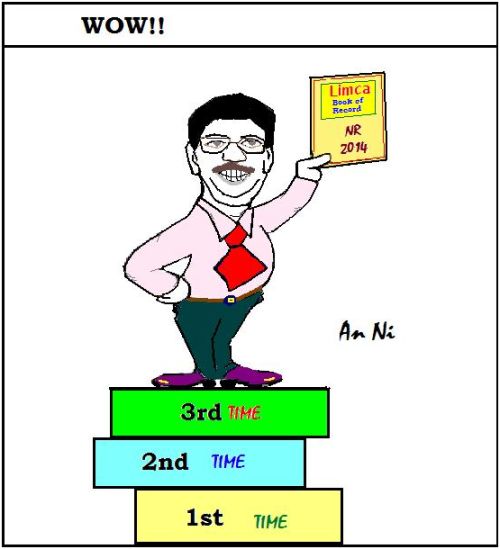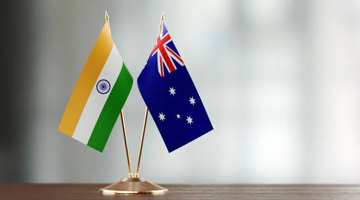 TIOL-DDT 2325 TIOL-DDT 2325
01.04.2014
Tuesday
THE Finance Minister, in his speech on Interim Budget 2014-15 on February 17 2014, made the following observation on Direct Taxes Code (DTC):-
"Revenues are of paramount importance. The best source of revenue is taxes and for that we need modern tax laws. I am disappointed that we have not yet been able to introduce GST. I leave it to you to answer the question, who blocked the GST when an agreement on the game-changing tax reform was around the corner? We have also got ready a Direct Taxes Code that will serve us for at least the next twenty years. I intend to place it on the website for a public discussion without partisanship or acrimony. I appeal to all political parties to resolve to pass the GST laws and the DTC in 2014-15."
Accordingly, CBDT has placed the DTC, 2013 on the Department's web site. A write-up on the significant changes in the proposed DTC, 2013 is also placed on the website. Comments, if any, on proposed DTC, 2013 may be sent on email ID: dtc13-dor@nic.in.
But shouldn't it be DTC 2014?
The history : The Income-tax Act was passed in 1961 and has been amended every year through the Finance Act. The Wealth-tax Act was passed in 1957 and has also been amended many times. Numerous amendments have rendered the two Acts incomprehensible to the average taxpayers. Besides, there have been several policy changes due to change in economic environment, complexity in the market, increasing sophistication of commerce, and development of information technology. There has also been a multitude of judgments (at times conflicting) rendered by the courts at different levels. This necessitated drafting of a Code to consolidate and amend the law relating to all direct taxes.
The Direct Taxes Code Bill, 2010 was introduced in the Lok Sabha on 30th August, 2010. The Bill was referred to the Standing Committee on Finance (SCF) on 9th September, 2010 for examination and report thereon. The SCF presented its report to the Speaker, Lok Sabha in March, 2012. A large number of recommendations of the SCF along with other suggestions which were forwarded at the examination stage have been accepted by the Government.
Since the Direct Taxes Code Bill, 2010 was introduced in the Parliament, amendments were carried out in the Income-tax Act, 1961 and the Wealth-tax Act, 1957 through Finance Acts, 2011, 2012 & 2013. These amendments were consistent with the policy laid down in the DTC Bill, 2010. Incorporating these amendments in the DTC Bill, 2010 would require a large number of official amendments making the Bill incomprehensible and the legislative process cumbersome. Hence, it was decided to revise the Direct Taxes Code incorporating all the amendments and presenting it as a fresh Bill. Accordingly, a new revised Direct Taxes Code was drafted.
Significant changes proposed in the Code:
Change in base of Wealth-tax : The DTC Bill, 2010 captured only unproductive assets for levy of wealth-tax. This substantially reduced the base for wealth-tax. To keep the base wide, the revised Code captures all assets for wealth-tax, whether physical or financial, thereby removing the distinction between physical and financial assets, which discriminated against those taxpayers who are conservative and put their money in physical assets. Wealth-tax is proposed to be levied on individuals, HUFs and private discretionary trusts at the rate of 0.25%. The threshold for levy of wealth-tax in the case of individual and HUF shall be Rs.50crores.
Additional tax @10 per cent on recipient of dividend (liable to Dividend Distribution Tax) exceeding one crore rupees : Under the Income-tax Act as well as in the DTC Bill, 2010, the dividend distribution tax is to be levied at the rate of 15%. This favours high net worth taxpayers who pay only a fraction of their earnings as tax on their investments in the capital market. The draft DTC proposes to remove this anomaly by levy of 10% additional tax on the resident recipient if the total dividend in his hand exceeds Rs.1crore.
Settlement Commission killed : Settlement Commission has not achieved the intended purpose of early settlement of cases and additional revenue realisation. At the same time, the backlog of cases has reduced the efficacy of search and survey actions. Accordingly, the draft Code does not provide for the machinery of Settlement Commission.
35 per cent tax rate for individual/ HUF having income exceeding Rs. 10 crore: With a view to maintain overall progressivity in levy of income- tax, the revised Code provides for a fourth slab for individuals, HUFs and artificial juridical persons. In their case if the total income exceeds Rs.10crore, it is proposed to be taxed at the rate of 35%.
The DTC 2013 contains 325 Sections and 23 Schedules. Obviously great amount of work has gone into this mammoth exercise - all for what? If BJP comes to power, they will outright reject this code as the devilish work of a wily Chidambaram, which should not be touched with a barge pole. Any other Government will be concentrating on survival that they will hardly have any time to look at silly legislation like DTC. And what is the point in releasing such a vital document only to get drowned in the cacophony of electioneering?
THE DIRECT TAXES CODE, 2013
Write-up on the DTC 2013
Tribunal has no power to extend stay indefinitely - Board wants recovery to be initiated
PERHAPS, nowhere in the civilised world, you will have a law which says that if the Government fails to do something, the citizen will be punished.
As per Section 35C (2A) of the Central Excise Act, if the Tribunal does not dispose of an appeal within a maximum period of 365 days, the Stay granted will be vacated.
At present, the standard time taken for the CESTAT to dispose of an appeal is six years! Why is the Tribunal not able to dispose of the appeals within one year? The answer is not difficult to find. The Government and the Government alone is to blame. They don't have enough Benches of the Tribunal and even in the existing Benches, they don't have enough Members. If they are serious about clearing the pendency in the Tribunal, let them create a hundred benches instead of wasting five years of their time in their cadre review which they are not able to implement. For the fault of the Government, the poor appellant assessee is to be punished. Isn't this barbaric?
In Commissioner of Cus. & C.Ex., Ahmedabad vs. Kumar Cotton Mills Pvt. Ltd. (2005-TIOL-42-SC-CESTAT), the Supreme Court observed,"The sub-section which was introduced in terrorem cannot be construed as punishing the assessees for matters which may be completely beyond their control. For example, many of the Tribunals are not constituted and it is not possible for such Tribunals to dispose of matters. Occasionally by reason of other administrative exigencies for which the assessee cannot be held liable, the stay applications are not disposed within the time specified."
The Tribunal in JP Transformers vs Commissioner of Central Excise - 2013-TIOL-1219-CESTAT-DEL, observed,"We consider the aforesaid decision of the Supreme Court to have purposively interpreted provisions of Section 35C(2A) of the 1944 Act, conscious of the supply-demand mismatch in the justice delivery system in so far as CESTAT is concerned…. Since the present appeal could not be disposed of within 365 days, for no fault of the assessee, and a prima facie case in favour the assessee was recorded by the earlier order dated 21.9.2012, the assessee should be entitled to waiver of pre-deposit of the assessed demand, during pendency of the appeal."
The Department was not happy with this extension of Stay by the Tribunal and took the matter in appeal to the High Court. The Allahabad High Court in Commissioner vs JP Transformers - 2013-TIOL-1152-HC-ALL-ST, observed, "Though we are conscious of the pendency of the appeals and workload assigned to the Principal Bench as well as various Benches of CESTAT, we are of the view that entire object and purpose of insertion of sub-section 2A in Section 35C by Section 140 of the Finance Act, 2002 (20 of 2002) w.e.f. 11.5.2002 and third Proviso by Finance Act, 2013 will stand defeated, if the waiver of pre-deposit is granted indefinitely. The judgment in Kumar Cotton Mills Pvt. Ltd. (Supra) cannot be interpreted to give powers to the Tribunal to extend the order of waiver of pre-deposit indefinitely."
The High Court directed CESTAT to decide the appeal expeditiously and if possible within a period of six months. Please note the High Court did not say that the Tribunal cannot extend the Stay beyond 365 days; it only said that it cannot extend it indefinitely. In any case, the judgement of the High Court is per incuriam .
This judgement of the High Court has become a good weapon for the CBEC to further its ambitious recovery plans.
In a recent letter to the Chief Commissioners, CBEC Member Joy Kumari Chander communicated a copy of the judgement and stated,
"The above judgment will be useful in effecting recoveries of arrears, where stay orders have been issued by CESTAT and the appeal itself not decided within 365 days of such stay order. In terms of section 35C(2A) of the Central Excise Act, 1944, such stay orders stand vacated after 365 days."
CBEC Letter in F.No.275/05/2014-Cx.8A, Dated: February 19 2014
Tariff Value of Gold, Oils decreased
THE Government has decreased the Tariff value of Gold from 445 USD to 421 USD per 10 gms and decreased that of Silver from 694 to 644 USD per kilogram with effect from 31.03.2014. Tariff values of other items are also reduced except poppy seeds. Tariff value of Areca Nuts remains same. The Tariff values as on14.03.2014 and with effect from 31.03.2014 are as under:
|
Table 1
|
|
S. No.
|
Chapter/ heading/ sub-heading/tariff item
|
Description of goods
|
Tariff value USD (Per Metric Tonne)
from 14.03.2014
|
Tariff value USD (Per Metric Tonne)
from 31.03.2014
|
|
(1)
|
(2)
|
(3)
|
(4)
|
(5)
|
|
1
|
1511 10 00
|
Crude Palm Oil
|
966
|
964
|
|
2
|
1511 90 10
|
RBD Palm Oil
|
1023
|
1002
|
|
3
|
1511 90 90
|
Others - Palm Oil
|
995
|
983
|
|
4
|
1511 10 00
|
Crude Palmolein
|
1030
|
1012
|
|
5
|
1511 90 20
|
RBDPalmolein
|
1033
|
1015
|
|
6
|
1511 90 90
|
Others -Palmolein
|
1032
|
1014
|
|
7
|
1507 10 00
|
Crude Soyabean Oil
|
1002
|
985
|
|
8
|
7404 00 22
|
Brass Scrap (all grades)
|
3952
|
3879
|
|
9
|
1207 91 00
|
Poppy seeds
|
3443
|
3691
|
|
Table 2
|
|
S. No.
|
Chapter/ heading/ sub-heading/tariff item
|
Description of goods
|
Tariff value USD
from 14.03.2014
|
Tariff value USD
from 31.03.2014
|
|
|
|
|
|
|
|
1
|
71 or 98
|
Gold, in any form in respect of which the benefit of entries at serial number 321 and 323 of the Notification No. 12/2012-Customs dated 17.03.2012 is availed
|
445 per 10 grams
|
421 per 10 grams
|
|
2
|
71 or 98
|
Silver, in any form in respect of which the benefit of entries at serial number 322 and 324 of the Notification No. 12/2012-Customs dated 17.03.2012 is availed
|
694 per kilogram
|
644 per kilogram
|
|
Table 3
|
|
S. No.
|
Chapter/ heading/ sub-heading/tariff item
|
Description of goods
|
Tariff value USD (Per Metric Tons)
from 14.03.2014
|
Tariff value USD (Per Metric Tons)
from 31.03.2014
|
|
1
|
080280
|
Areca nuts
|
1872
|
1872 (No Change)
|
Notification No. 25/2014-Cus (NT), Dated: March 31, 2014
CBDT Designates Principal Chief Commissioners in 18 Locations
THE 18 Chief Commissioners of Income Tax who have been promoted as Principal Chief Commissioners are designated as Principal Chief Commissioners at Ahmedabad, Bangalore, Bhopal, Bhubaneswar, Chandigarh, Chennai, Delhi, Guwahati, Hyderabad, Jaipur, Kanpur, Kochi, Kolkata, Lucknow, Mumbai, Nagpur, Patna and Pune.
CBDT Order in F. No. HRD/CM/102/28/2013-14, Dated: March 31, 2014

Jurisprudentiol - Wednesday's cases
 Customs Customs
Appellant was not importer but somebody played fraud by using their name to import goods and which were confiscated and penalty was imposed on appellant - Commr(A) exonerated appellant from penalty but observed that further action may be taken to find whether appellant colluded/connived in fraud - as Commr(A) exceeded his jurisdiction by making such observations, this portion of order set aside - appeal disposed of: CESTAT
M/S UPS Jetair Express P. Ltd., Mumbai filed one bill of entry in the name of the appellant M/s Tata Consultancy Services Ltd. as importer. The Customs authorities at CSI Airport, Mumbai held the goods liable for confiscation and accordingly the same were confiscated and allowed to be redeemed on payment of fine. Penalty was also imposed on the appellant.
When the said order of adjudication was received by the appellant, the appellant was shocked as they had not imported any consignment through M/s UPS Jetair Express.
Therefore, they filed an appeal before the Commissioner (Appeals) on the ground that as they are not the importer and somebody had played a fraud by using their name in importing the impugned goods the penalty be waived.
Income Tax
Whether, for purpose of benefits u/s 80IB(10), area of rear courtyard enclosed by walls of residential unit is to be taken into account to compute built up area - NO: Bombay HC
THE assessee concern had submitted its return of income declaring a total income of Rs.53,620/- on 30.10.2006. An order was passed u/s 143(3) on 21.11.2008 on the returned income. Thereafter, CIT invoked its jurisdiction u/s 263 and set aside the order passed u/s 143(3) with a direction to AO to examine the relevant facts in connection with the claim of deduction u/s 80-IB(10). After examination, AO concluded that the assessee was granted permission on 07.07.2003 by the Margao Municipal Council for construction of row villas with built-up area of 1500 square feet comprising of ground floor and first floor and the compound wall in the property situated at Fatorda,Margao. The AO noted that the assessee had not fulfilled the conditions specified u/s 80-IB(10) essentially on the ground that only flats or apartments constructed on the land will have common areas sharing with other residential units and as such since the construction of villas/bungalows/row houses were independent and do not share common areas, the assessee did not fulfill one of the conditions specified u/s 80-IB(10) and as such invited the objections of the assessee.
The issues before the Bench are - Whether the area of the rear courtyard enclosed by walls of a residential unit is to be taken into account to compute built up area for the purpose of Sec 80IB(10) benefits; Whether in case there is no construction activity on the area of the courtyard which is open to the sky, it can still be included to compute the built-up area u/s 80IB and Whether the Tribunal can inquire into and get measured the courtyard which is not included in the built-up area and which is not the lis between the parties. And the verdict favours the assessee.
Service Tax
CENVAT - Rule 2(l) of CCR, 2004 - ST discharged by Recovery agents on seizing charges under BAS is an Input service for appellant registered as Banking and Financial Service provider prior to 01.04.2011 as it is an 'activity related to business' - Pre-deposit ordered of Credit taken post 01.04.2011: CESTAT
THE appellant is engaged in providing Banking and Financial Service and Insurance Auxiliary Service. They are also in the business of lending money for purchase of vehicles to their customers. When the customers who have taken the money default in repayment of loan, they have the right over the vehicles and they take possession of these vehicles by engaging the services of recovery agents. These recovery agents seize the vehicles and handover the same to the appellant and recover seizing charges.
The recovery agents discharged Service Tax on seizing charges under the category of Business Auxiliary Services. The appellant took CENVAT Credit of the service Tax paid on the seizing charges during the period 2007-08 to 2011-12 amounting to Rs.95,25,997/-.
The Revenue was of the view that CENVAT credit of the Service Tax paid on the seizing charges is not permissible under the law inasmuch as the seizing of vehicles is not an input service for the lending activity undertaken by the appellant.
See our Columns Tomorrow for the judgements
Until Tomorrow with more DDT
Have a nice day.
Mail your comments to vijaywrite@taxindiaonline.com |









 Download PDF
Download PDF

 Customs
Customs 



